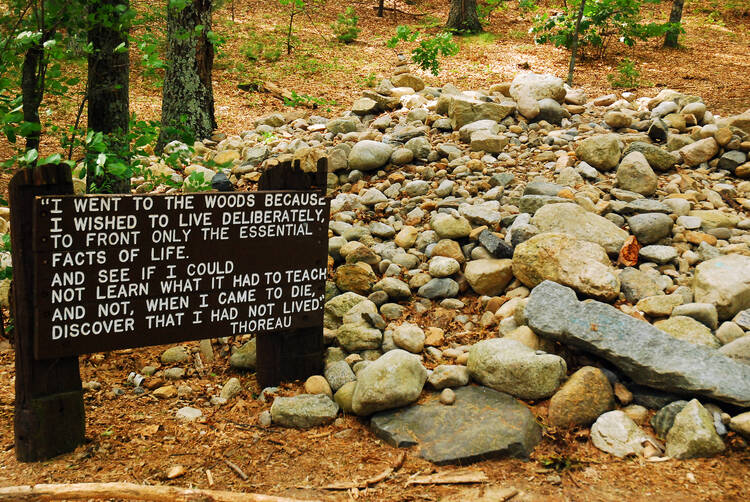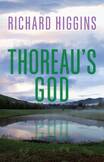Review: With God at Walden Pond
Henry David Thoreau is the original American antihero, famous for resisting industrial capitalism and elite society to sojourn in the woods. His disdain for organized religion and love of nature has inspired generations of seekers who want to understand themselves and the world outside of the four walls of a church. But he also had a deep and abiding faith in God as his creator.
In his new book, Thoreau’s God, Richard Higgins shows us that while Thoreau disdained organized religion and Christianity, he was a “deeply religious person without a religion.” It is a fascinating journey through Thoreau’s extensive work, looking at the ways the philosopher thought about the divine and the human relation to the divine.
This is a book of theology, not spirituality. It does not try to offer guidance for the reader on how to live one’s life, just guidance on how to interpret how Thoreau lived his. I appreciated this, and enjoyed the author’s writing style, which is tightly woven around quotations. At the same time, Higgins’s own devout Unitarianism (he is a member of the church Thoreau rejected, First Parish Concord) clearly undergirds his writing, in a way that feels appropriate for a book about a man who is perhaps the closest to a saint Unitarians get—even if he didn’t always like their version of institutional religion very much.
I felt that I could not adequately review a book about Thoreau if I read it entirely in my apartment. So I left my phone in my room and set out for the train without looking at a timetable. It was a lovely experience to see a squirrel jump from one branch to another, to see a chipmunk eating its lunch without realizing I was observing it, and to see ants that were undoubtedly warring with other ants just as the ones Thoreau observed in Concord were.
I thought about the plants and animals I saw that were part of the same lineage of New England wildlife observable in the 1840s. I contemplated the dead leaves that would become fertilizer for new life and the mushroom growing from a dying log. I thought about the rocks that were there when Thoreau was across the river studying at Harvard, that were there when all inhabitants of this land were Indigenous people, that were there long before any human ever stepped foot on this continent and that will be there long after we are here.
I would recommend this as a way to read Higgins’s book. Thoreau was frustrated by organized religion because he did not think words could adequately express the human relationship with God. It had to be personally experienced, and for Thoreau, that meant through the world God created. We aren’t going to live at Walden Pond, but we can have a 21st-century version of radical disconnection. It’s good to be truly physically grounded while reading about a man who deeply yearned for the ineffable that he felt could only be found in a temple without walls.
I also discovered a hollow tree stump in which someone had carefully planted flowers. An Alcoholics Anonymous chip had been tied around part of the stump: Clean and serene for 60 days. If nature is to be a temple, then this is where people left their offerings.
I liked it, but I’m not sure Thoreau would have. He was frequently disdainful of other people’s more material expressions of religion, and he struggled heartily to connect with other people, even those he considered friends.
Higgins also examines Thoreau’s melancholy, including his suicidal thoughts. This is a man who was deeply, deeply depressed, in part because of the death of his brother but also because of his difficulties with fitting in with those around him.
While Thoreau rejected his Puritan heritage, he was also deeply rooted in its theology and aesthetic. Higgins shows the immense breadth of biblical allusions Thoreau used, a far more expansive list than those of his less-religious contemporaries like Ralph Waldo Emerson or Emily Dickinson. And like many 19th-century New England transcendentalists, he had an appreciation for a faith tradition that in many ways represented the antithesis of Puritanism: Catholicism.
As he disliked any sort of organization or materiality, Thoreau would never become Catholic like his friend Isaac Hecker or his teacher Orestes Brownson. But he was shocked to see young rural Canadians kneeling in the cathedral in Montreal, and admitted he could not imagine seeing any young rural men from Massachusetts kneeling in the Concord meeting house. Only Catholics, he mused, still knew how to be reverent.
One of Thoreau’s chief complaints with American organized religion was its failing to take a serious stance on the major moral issue of the day: slavery. Even in Massachusetts, one of the most pro-abolition states in the country, many churches were tepid or silent on the subject. While he did not believe in the divinity of Jesus, Thoreau appreciated Jesus’ teachings on the poor, and he felt like the church had abandoned them.
It is impossible to not see parallels to our own time. But this is not a book that is making an explicit commentary on contemporary issues. When so many politically progressive books feel didactic, it is refreshing to read one that doesn’t.
Higgins uses Thoreau’s extensive corpus to carefully analyze his religion: He delves into not just Walden but also A Week on the Concord and Merrimack Rivers and Thoreau’s many essays and letters, not all of which were published. The chapters in Thoreau’s God focus on different dimensions of Thoreau’s spirituality, such as his mystical experiences in nature, his complicated relationship with Jesus and traditional Christian theology, and the way he understood silence and that which cannot be spoken in relation to God.
I found myself thinking about institutional failure while I was consuming Thoreau’s God. Reading it at the Chestnut Hill Reservoir, I was able to see the campus of the Boston College School of Theology and Ministry, where I had taken a class. The Archdiocese of Boston had sold that property to the university years before, in part to pay for all of its sex abuse lawsuit settlements.
I also see shuttered churches every day that closed because they could not convince enough people they were worth attending, which is a different kind of institutional failure. Thoreau’s anger, both about lack of moral fortitude and about the pointlessness of religion in general, can be easy to understand.
Even someone deeply committed to their faith community will find something that resonates in this book. Thoreau did not think the issues with institutional religion were fixable, which many people, including his friends who were Unitarian ministers, would disagree with. But in a world where rejecting formal religion but not belief is increasingly prevalent, how better for those who remain in the church to understand this mindset than through their most famous representative?
Thoreau’s God is a well-written tome that offers a focused look at one of America’s most prominent authors. It offers insight into Thoreau not as a naturalist or a secular ascetic but as someone who believed strongly in God as love. Regardless of your religious beliefs, this book is worth reading for anyone interested in American religious experience.











